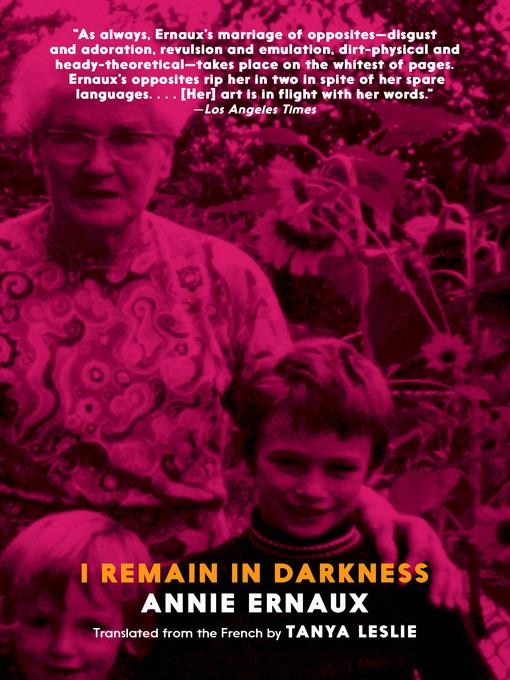
I Remain in Darkness
- اطلاعات
- نقد و بررسی
- دیدگاه کاربران
نقد و بررسی

July 1, 2003
Again blurring the line between memoir and fiction, Ernaux continues the story of her family in journal form. This slim volume is a quietly searing account of Ernaux's mother's deteriorating health after she was diagnosed with Alzheimer's disease, in 1983, and her heart attack and death in April of 1986. At first the formerly independent mother moves in with Ernaux and her sons. Then, as her memory losses become crippling, she is admitted to a geriatric hospital. Ernaux keeps a journal, recording the details of her mother's slow decline: the way she shrinks until she's like a little doll, the diaper she wears to control incontinence, the smell of the cologne that masks sickroom odors. Ernaux also records her own reactions: she is defiant when shopgirls eye her mother with contempt, dismayed when her mother no longer even tries to look for her mislaid toiletry bag, guilt-ridden but trying to remain emotionless as the years pass by, then finally overwhelmed by a flood of feeling after her mother's death. The selection of significant detail is thoughtful and poetic, arranged in a simple memoir format. Several recurring themes are woven throughout, notably those of time, art and the relationship between mother and daughter. Ernaux suggests that the beloved mother who gave her birth (reminding her of the Courbet painting The Origins of the World, which depicts the open thighs of a recumbent woman) is being consumed by time and that Ernaux, through her art, can restore her original image. It is a motif similar to, although in no way as richly developed as, that of Shakespeare's Sonnet 15: "As he takes from you, I engraft you new." Like Ernaux's other work (Shame; Simple Passion), this is "not literature" exactly, but "an attempt to salvage part of our lives, to understand, but first to salvage," poignant though limited in its reach.

November 15, 1999
Unlike Aaron Alterra's The Caregiver (LJ 10/15/99), this slim volume by noted French writer Ernaux (Simple Passion) is not a straightforward medical account of her mother's death from Alzheimer's; instead, it is a collection of the notes, in their original form, that Ernaux jotted down at the time of her mother's illness. "When I write down all these things, I scribble away as fast as I can (as if I felt guilty), without choosing my words." Here in their raw, uncensored form are the "vestiges of pain"--the anger, guilt, and grief that Ernaux felt during her mother's two-year decline. Here are the graphic images of her once-powerful mother wearing diapers, the woman in the next bed peeing on the floor, a drawer in the bedside table filled with a human turd. Because the notes have not been edited, there is a choppy, unpolished feel to the book, which is perhaps Ernaux's intention--as a possible counterpoint to A Woman's Story (1991), her fictionalized memoir of her mother's life and death. For literary and Alzheimer's collections.--Wilda Williams, "Library Journal"
Copyright 1999 Library Journal, LLC Used with permission.

November 1, 1999
Eleven years elapsed between Ernaux's mother's death from Alzheimer's disease and the publication of Ernaux's journal recording her mother's decline. Even then, the French novelist and memoirist found the experience of her mother's illness so tender that she decided to publish the journal unchanged, so that "the astonishment and distress" she felt would not be blunted by any impulse to prettify. More than astonishment and distress, though, horror and guilt inform Ernaux's spare account of her mother's departure from Ernaux's home when her disability became too much for Ernaux and the two years of Ernaux's visits to her mother in hospital and nursing home. Offsetting the horror is Ernaux's mother's retention of a few strong characteristics right to the end, and exacerbating the guilt, which virtually all those with an Alzheimer's-afflicted loved one feel in some degree, is Ernaux's divorce, stemming from a love affair she began simultaneously with moving her mother out of her home. Perhaps the saddest thing about the book, however, is the title--the last words Ernaux's mother ever wrote. ((Reviewed November 1, 1999))(Reprinted with permission of Booklist, copyright 1999, American Library Association.)




دیدگاه کاربران